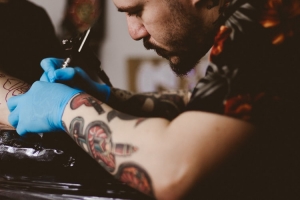One in five Aussies has one or more tattoos: getting inked is a common trend across the country. However, while many may gain a boost of confidence from their tattoos, it's possible that others may experience signs that are similar to addiction, such as withdrawal, or an inability to stay away from the tattoo parlour.
While many people do claim to be addicted to getting more and more tattoos, here’s what science says on whether or not it’s really addictive - and what it could potentially mean for your mental health.
The facts
While there’s no solid evidence to prove that getting tattooed is addictive, there are many factors that make it seem like it could be. For instance, getting a tattoo can release adrenaline (resulting in an adrenaline rush) and endorphins, which is why many may feel such a positive mental reaction after getting one. This is also the reason why, despite the pain that one might endure in getting a tattoo, the desire for another can be strong - much like how a roller coaster can be scary, while at the same time presenting you with an experience that you might chase for the rush.
As for the tattoo itself, there’s nothing within it that could be considered an addictive substance - even though rubbing alcohol and ink are used throughout the process, they don’t get injected or make it into the bloodstream (like other addictive substances, such as drugs and alcohol would). 
Why people get tattoos
To understand the mental effects of getting a tattoo, it’s important to realise why most people choose to do so in the first place. For many, getting a tattoo can simply be a form of self-expression, a display of artwork, or a tribute to someone or something important in their life (such as memorialising a loved one who has passed, or getting the coordinates of a special location tattooed on them).
Meaningful tattoos are common in today’s day and age, and getting one that you really like and feel good about can often allow for a boost of confidence and an elevation of self-esteem. In fact, one study suggests that women who have several tattoos have higher self-esteem than women who have fewer or none at all: getting a tattoo can be seen as a coping mechanism for those going through a difficult time. However, for those who may be “addicted” and get inked for reasons such as validation or acceptance from others, there may be some downfalls.
Potential addiction
While not enough research has been done to determine whether or not tattoos really are truly addictive, addictive behaviour patterns can be associated with them. For example, someone who is addicted to something may experience symptoms such as withdrawal, lack of control, the inability to stay away from the addiction, and ignoring risk factors. For potential tattoo addicts, the practice could become dangerous if they were to risk infection, try to tattoo themselves (without experience), or engage in other other harmful addiction behaviours, such as spending all of their money on more tattoos.
Potential tattoo addiction could be harmful in other ways as well - for instance, one who seeks validation from others through getting several tattoos could experience low self-esteem (which could lead to depression). However, for the many people who do consider themselves tattoo addicts, getting inked over and over again shouldn’t be a problem - as long as there aren’t any signs of harmful addiction habits or poor mental health along the way. If there are signs of harmful addiction habits, it’s important to get help as soon as possible.
Tattoos can be a great form of self-expression, While it’s not confirmed whether or not getting inked can be addictive, those who claim to be are safe - unless, of course, it results in mental or physical harm (such as infection or poor mental health).
v\:* {behavior:url(#default#VML);}
o\:* {behavior:url(#default#VML);}
w\:* {behavior:url(#default#VML);}
.shape {behavior:url(#default#VML);}